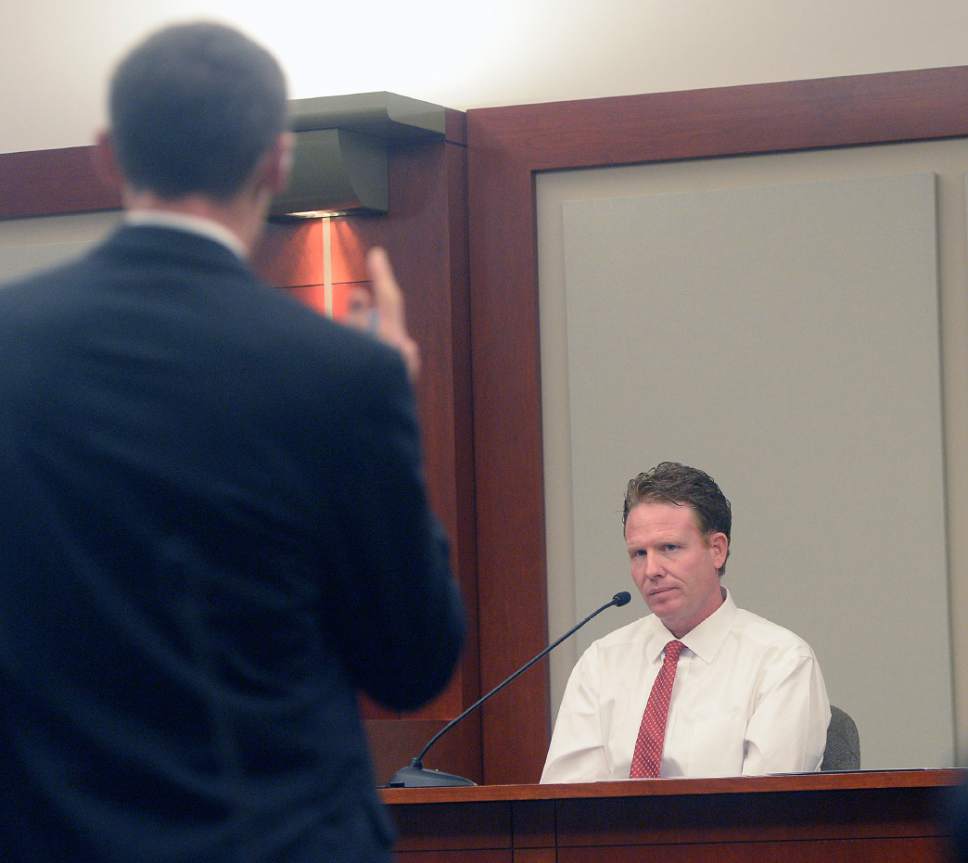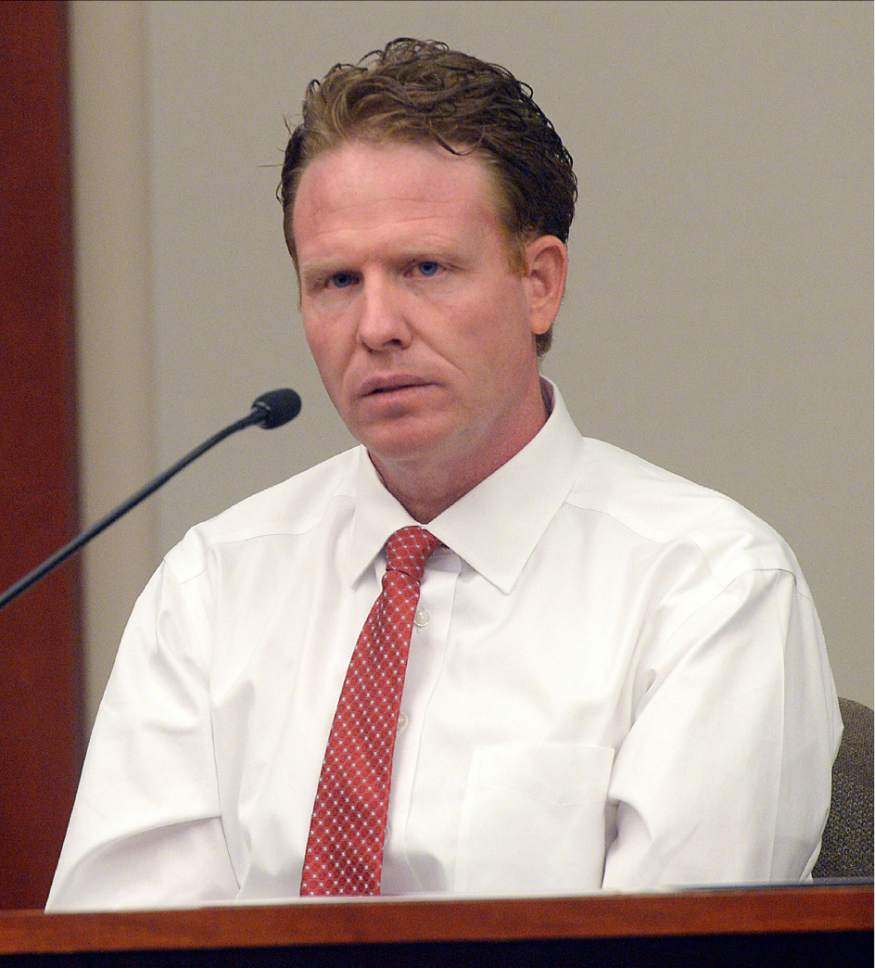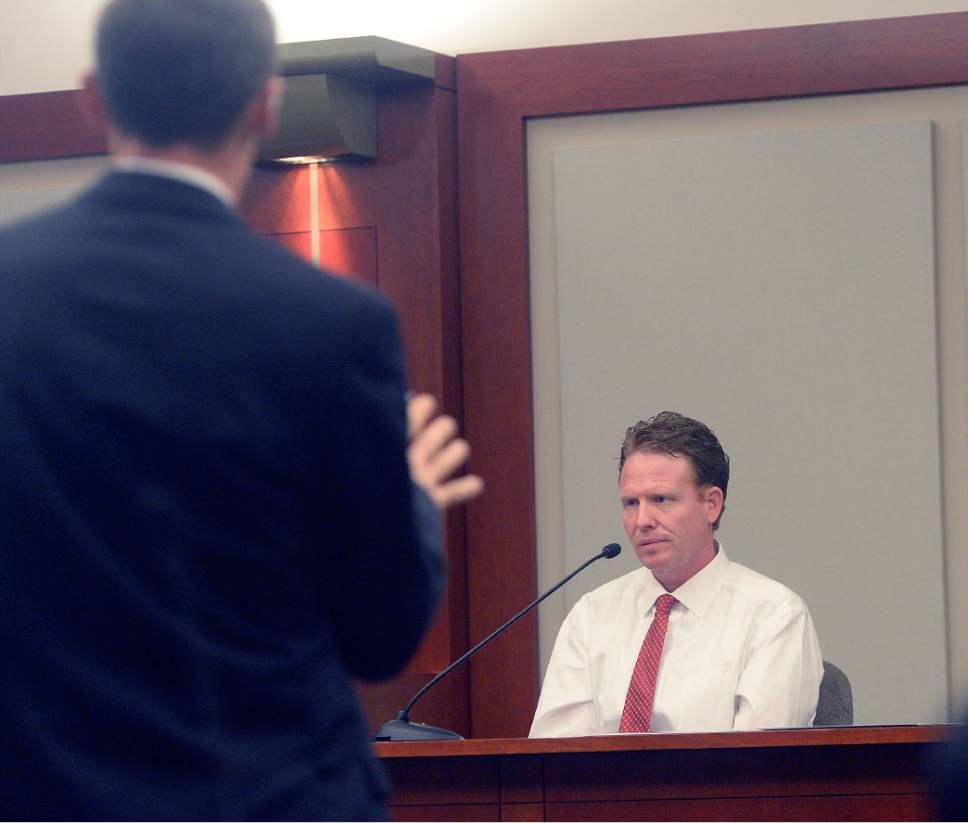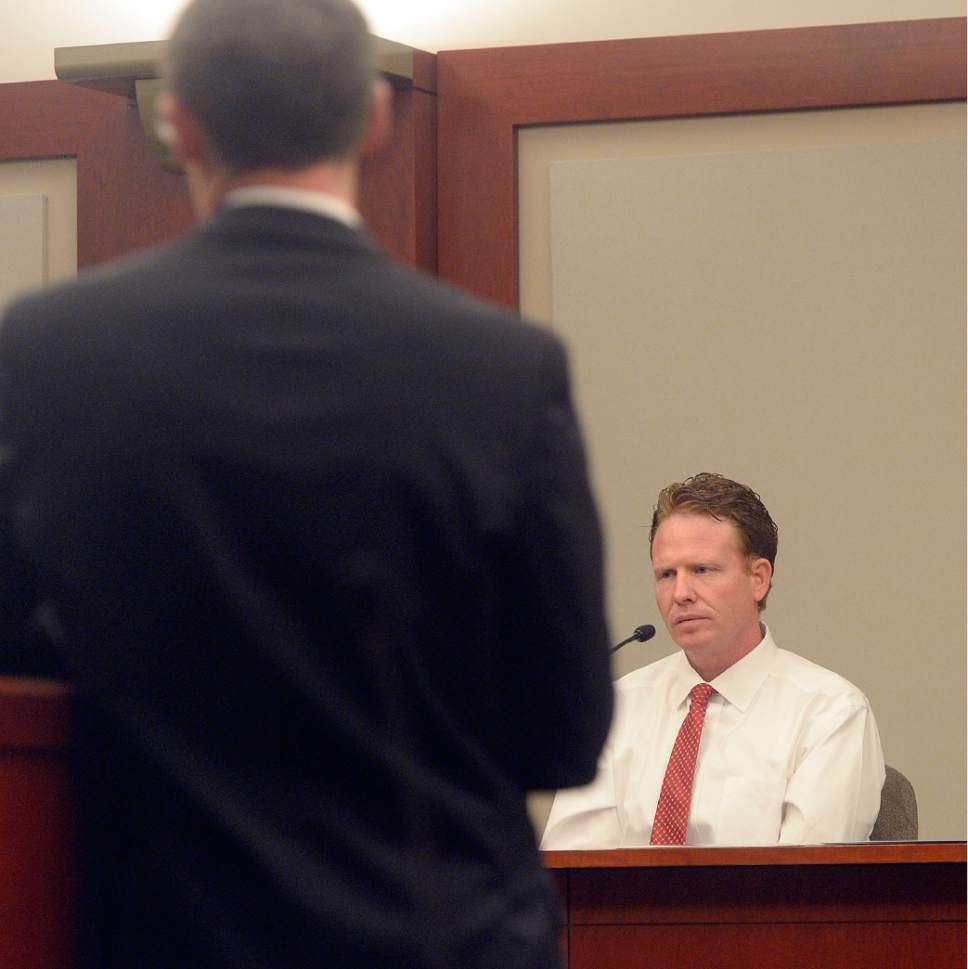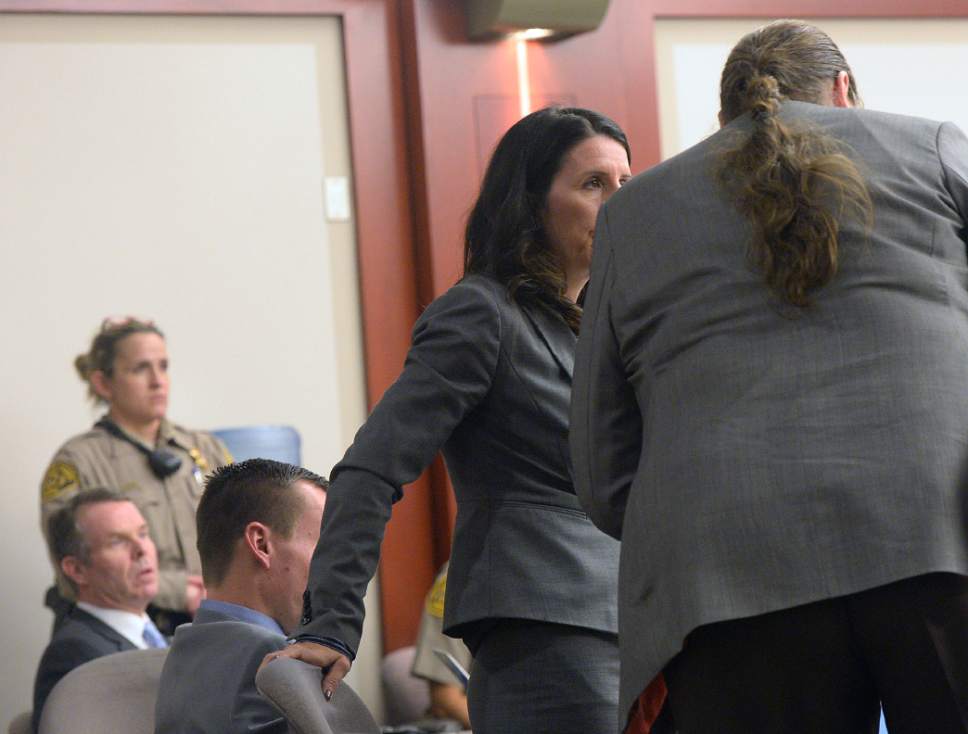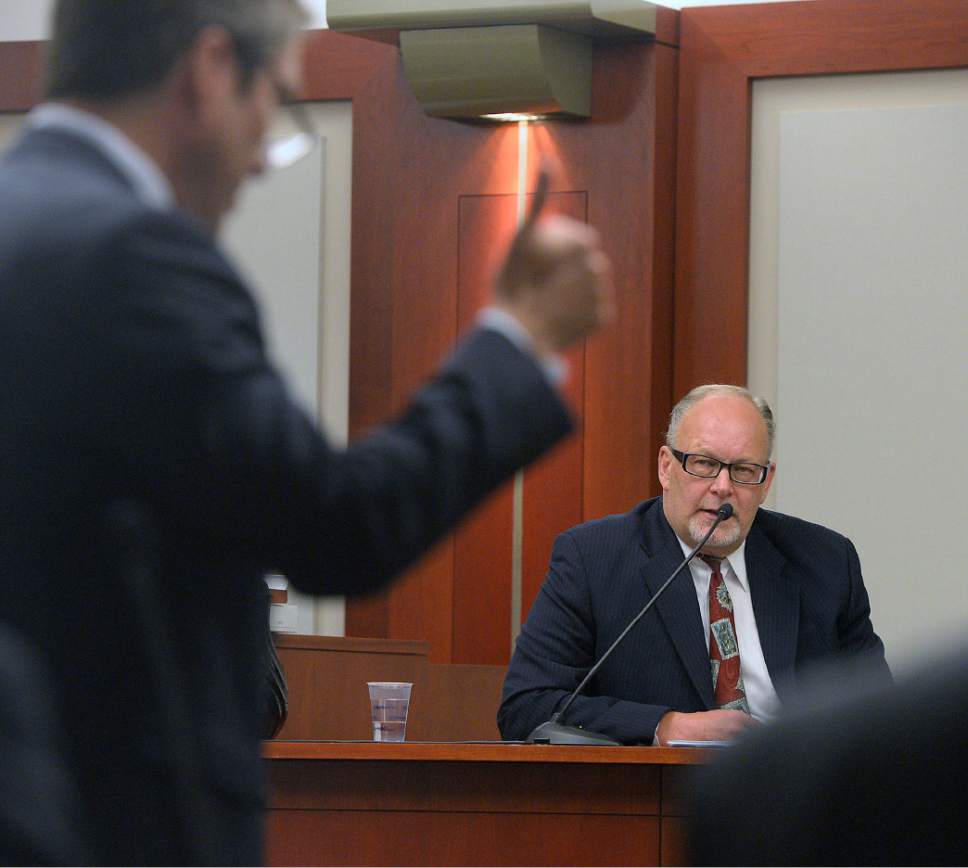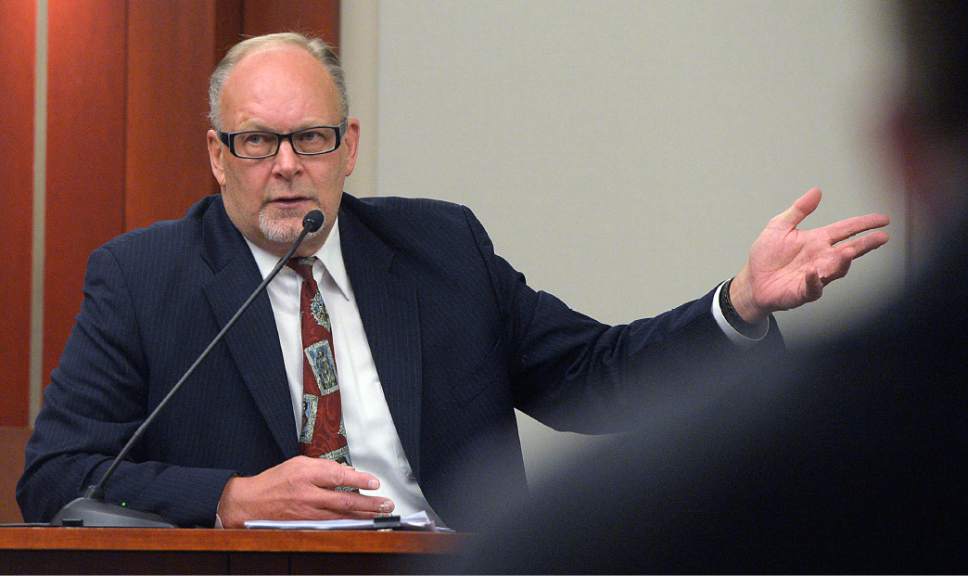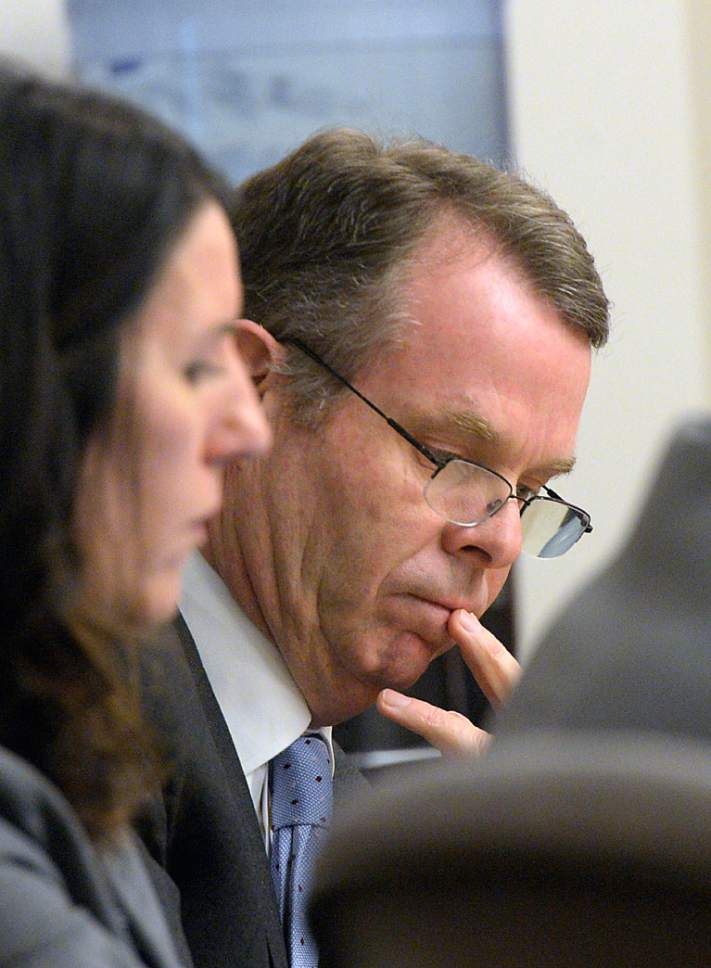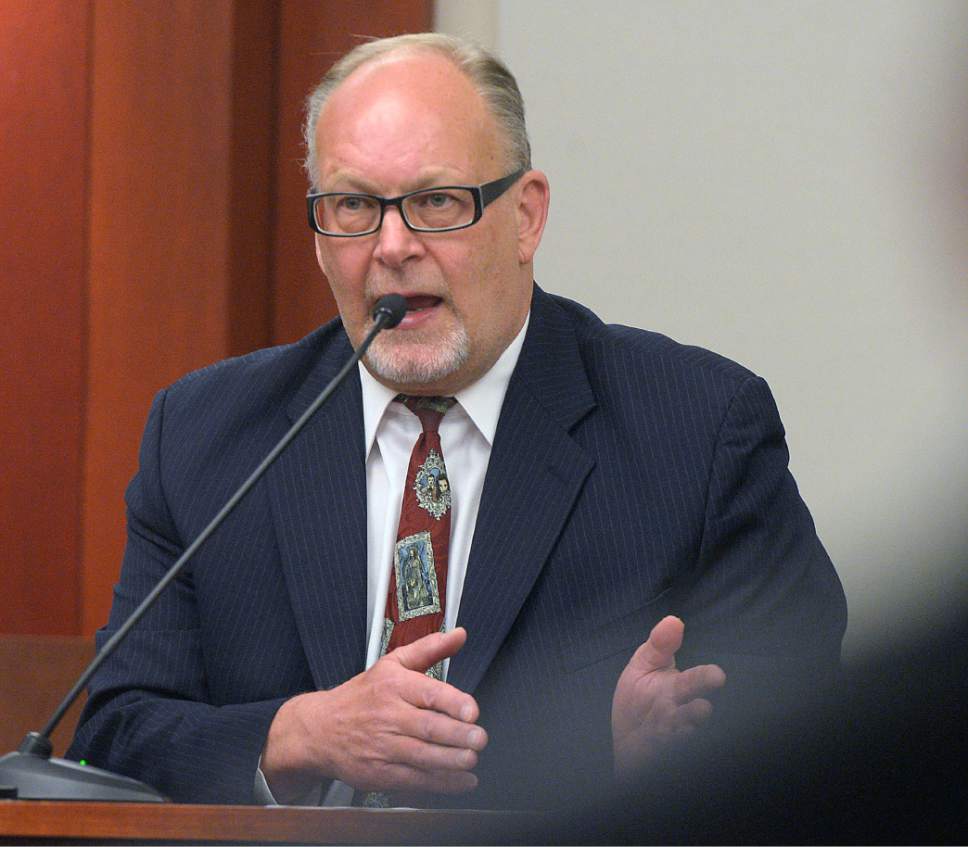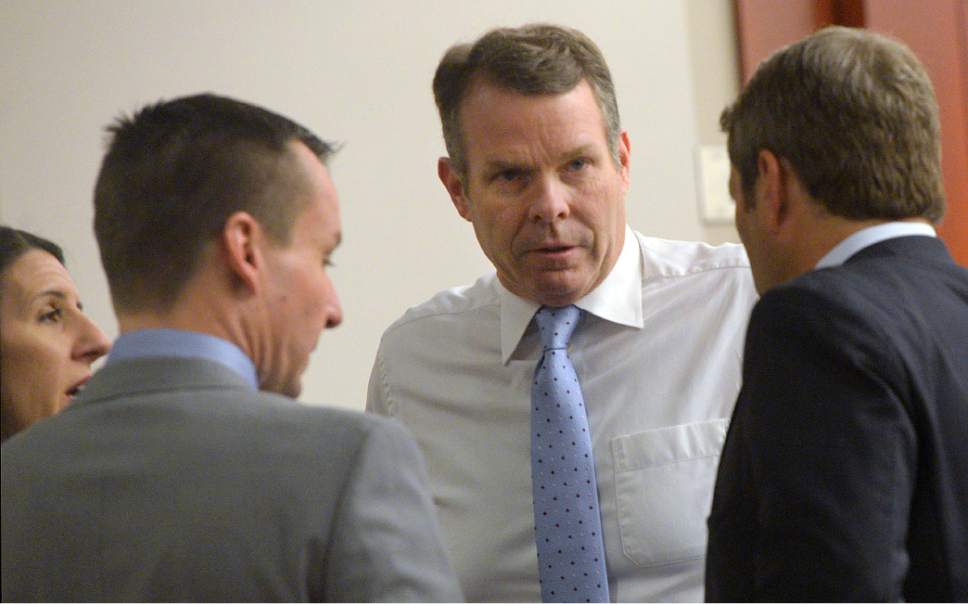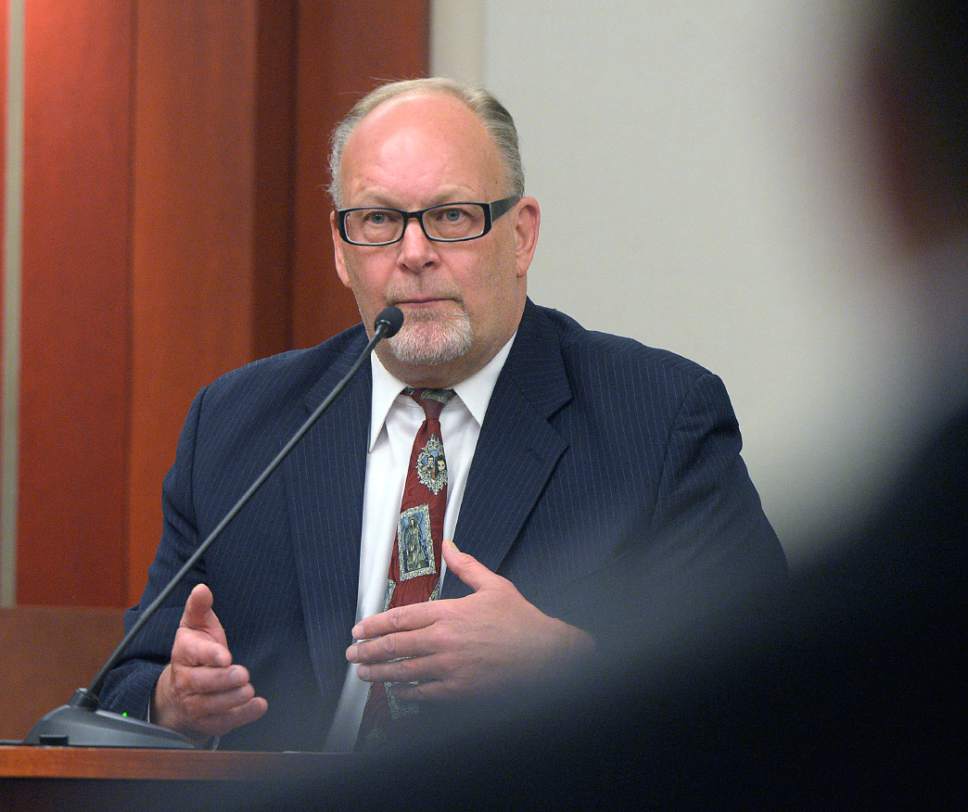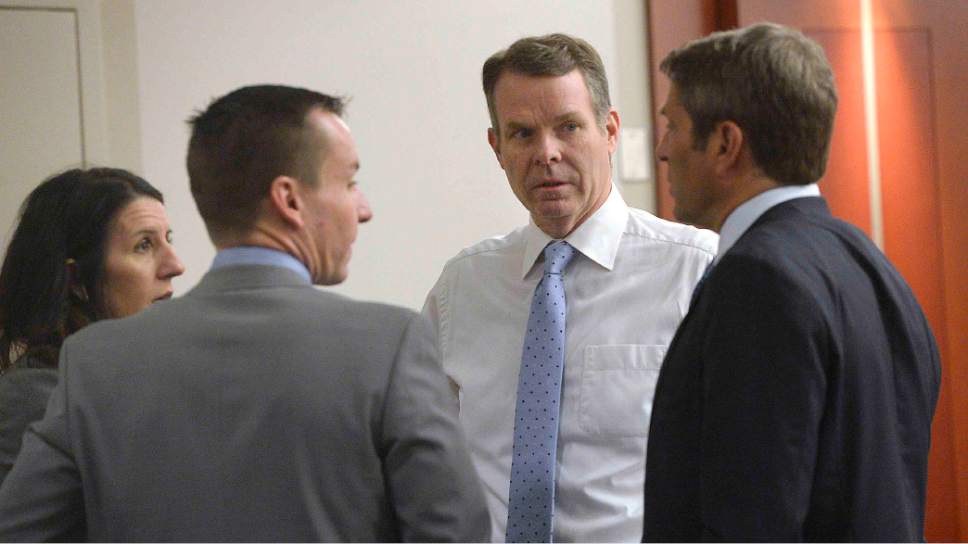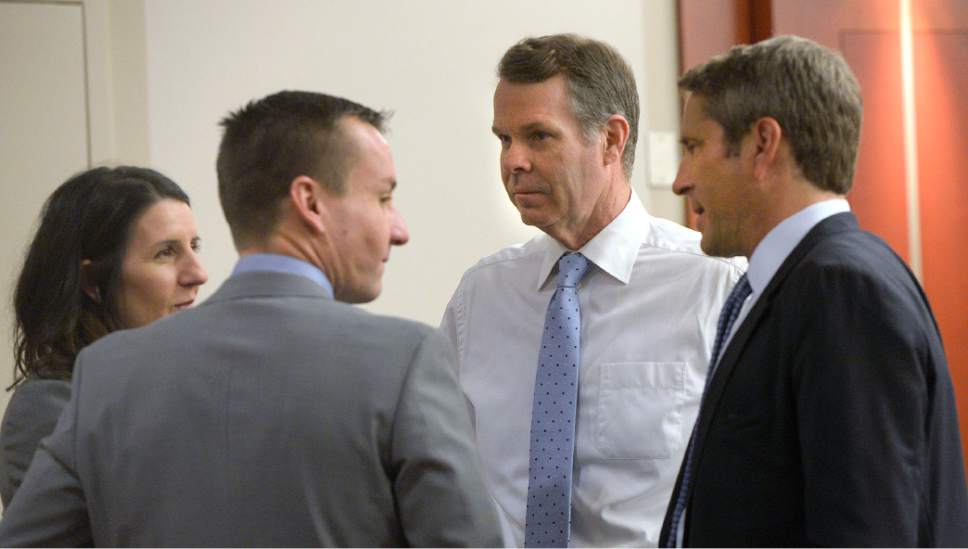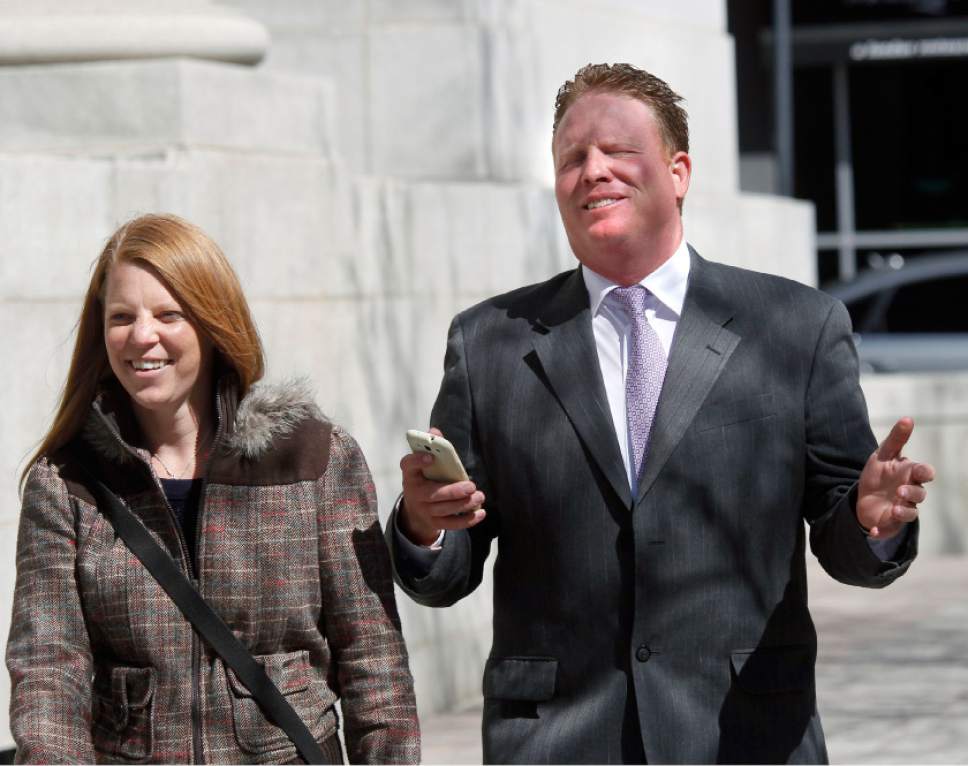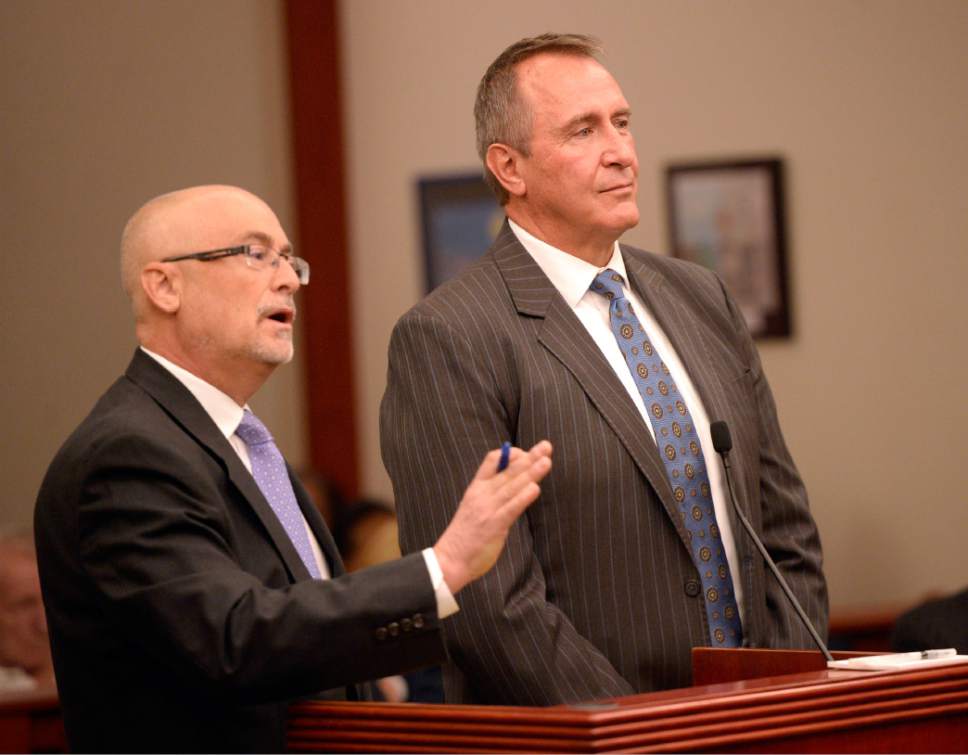This is an archived article that was published on sltrib.com in 2017, and information in the article may be outdated. It is provided only for personal research purposes and may not be reprinted.
Day six of former Utah Attorney General John Swallow's public-corruption trial began Wednesday with the cross-examination of Assistant Utah Attorney General Scott Reed.
Reed, who was hired by former Utah Attorney General Mark Shurtleff and later worked for Swallow, is the prosecutor who negotiated a 2008 plea deal for businessman Marc Sessions Jenson.
On Tuesday, Reed told a jury that Shurtleff's interest in the case was unusual and frustrating, because it appeared Shurtleff was negotiating a backdoor deal directly with Jenson and Tim Lawson, Shurtleff's so-called "fixer."
The proposal, Reed testified, was far more lenient than what he thought was appropriate. Reed said he had talked to Jenson's defense team about a deal that included pleading guilty to a pair of felonies and a restitution payment for the victims of $4.1 million. But in an email, he learned Shurtleff had discussed offering Jenson a no contest plea-in-abeyance that included no money for victims.
Reed told the jury he called Shurtleff to tell him, "We can't do this."
"His response to me was, 'Well, I kinda already told them that we would,' " Reed said.
Swallow has pleaded not guilty in 3rd District Court to 13 felony and misdemeanor charges, stemming from allegations of fostering a pay-to-play climate inside the attorney general's office.
The latest from Day 6 of the trial:
3:30 p.m.
A judge on Wednesday found imprisoned St. George businessman Jeremy Johnson in contempt of court after the former online marketer refused to testify in John Swallow's public-corruption trial — despite a promise of immunity.
Third District Judge Elizabeth Hruby-Mills sent Johnson to jail for 30 days after prosecutors attempted to question him without success.
"I understand that it's not in my best interests to answer any questions," Johnson told Deputy Salt Lake County District Attorney Fred Burmester in response to a question.
And when Hruby-Mills then ordered Johnson to answer, he apologized to the court, but didn't comply.
"I don't mean to disrespect the court," Johnson told the judge. "But I can't answer."
Johnson will be brought back to court Thursday morning to see if he has had a change of heart, the judge said.
Johnson is a key witness in the state's prosecution of Swallow. Four of the 12 felonies Swallow faces are tied to his interactions with Johnson.
Before testimony began Wednesday, prosecutors told the court they had learned Tuesday night that Johnson would refuse to testify. In response, the district attorney's office offered Johnson a immunity deal to protect him from the threat of being prosecuted for anything he might say on the stand.
That brought Johnson's lawyers, Mary Corporon and Karra Porter, to court to explain that Johnson was resisting testimony because past promises of immunity had not been honored, particularly by the federal government. Those deals were in relation to both the Shurtleff and Swallow cases.
"Mr. Johnson has been here before," said Corporon, adding that those experiences had only bought Johnson more trouble, including a Federal Election Commission action.
Johnson was convicted in federal court last year on federal bank charges. He is now serving an 11-year prison sentence and was brought to Utah from California to testify.
"From our perspective, and everything that has transpired since, that prosecution indicates that the federal government will bend every possible effort to prosecute Mr. Johnson and to do so as vigorously as possible," Corporon said. "State grants of immunity will mean nothing."
Swallow's defense attorney Scott C. Williams declined to comment on Johnson's refusal to testify, but he told the court it would alter the defense's strategy moving forward.
—
2:55 p.m.
With jurors out of the courtroom, Jeremy Johnson — wearing a white shirt, tie and handcuffs — took the witness stand and said he intends to invoke his Fifth Amendment privilege against self-incrimination and refused to testify.
State: You intend to invoke the 5th?
Johnson: Yes, sir.
Johnson is asked if he knows about the immunity letter obtained by prosecutors.
Johnson says he's been advised not to answer.
State asks judge to order him to answer.
Johnson's attorney, Mary Corporon, says there is still an issue and court should let him to invoke the Fifth.
The state is going to take a run at some questions.
Johnson: I understand it's not in my best interest to answer any questions.
Judge: Mr. Johnson, I am ordering you to answer.
Johnson says he doesn't mean to disrespect the court, but says he can't answer.
The state asks the judge to hold Johnson in contempt of court.
Judge Elizabeth Hruby-Mills says there is no validity to Johnson's claim of Fifth Amendment concerns.
She says he is in contempt of court and orders him to send 30 days in jail. But he will be brought back Thursday to see if he has a change of heart.
—
2:45 p.m.
Jeremy Johnson's attorney, Mary Corporon, tells the court that a letter which prosecutors obtained from the Department of Justice's Public Integrity Section is not a letter of immunity.
Corporon said the letter is merely a legal opinion and one with which she disagrees.
Corporon told Judge Elizabeth Hruby-Mills that she can't advise Johnson to waive his Fifth Amendment privilege and testify.
The judge, however, said it appears that immunity has been granted.
The judge orders Johnson to testify, saying she doesn't believe that there is any risk that he will be prosecuted.
Corporon steps outside to talk to Johnson. They are going to take a run at testimony without the jury present, to see how it goes.
—
2:15 p.m.
During a break between witnesses, Deputy Salt Lake County District Attorney Fred Burmester told the court he had received a letter from the Department of Justice's Public Integrity Section stating that they will agree to a immunity deal for prosecution witness Jeremy Johnson.
Burmester said he had forwarded the letter to Johnson's attorneys.
Judge Elizabeth Hruby-Mills ordered prosecutors to contact Johnson's attorneys and get them back in the courtroom.
Johnson's attorneys had previously said that he intended to invoke his Fifth Amendment right against self-incrimination and refuse to testify.
Court is in recess until the attorneys arrive.
—
1:30 p.m.
With jurors out of the room, Judge Elizabeth Hruby-Mills asked state prosecutors if they had approached federal prosecutors about signing off on immunity for Jeremy Johnson — who apparently intends to invoke his Fifth Amendment right against self-incrimination and refuse to testify.
State prosecutors said, yes, a letter was coming from the Department of Justice.
State prosecutors said they learned of this issue only last night. But Johnson's attorney, Mary Corporon, said that the FBI and local prosecutors saw Johnson in prison six weeks ago, and he told them to expect this.
Corporon said immunity deals — so called "Queen for a Day" letters — often take time to get.
John Swallow's defense attorney Scott C. Williams said the defense strategy is impacted by whether Johnson testifies. He said he doesn't want to plow ahead.
The judge says Johnson won't be called until the letter from the feds comes through. So Johnson is in a holding pattern.
The jury was then seated and the state called Michelle Law, a friend of Swallow.
—
12:30 p.m.
Jeremy Johnson's attorney, Mary Corporon, told Judge Elizabeth Hruby-Mills that Johnson intends to invoke his Fifth Amendment right against self-incrimination and not testify.
If Johnson doesn't testify, it could undermine the state's case against John Swallow, in which four of the charges are directly tied to Johnson, though a mistrial might also be possible because prosecutors told the jury that Johnson was going to be a witness.
Deputy Salt Lake County District Attorney Fred Burmester said state immunity will protect Johnson from any federal charges.
Corporan countered that Johnson has been here before, and that the experience of immunity assurances had bought him trouble.
Johnson fears the feds will prosecute him again, and that immunity is meaningless, Corporon said.
She said federal attorneys have used statements that Johnson had given under an immunity agreement with a state prosecutor against him in a Federal Election Commission lawsuit.
For Johnson to accept the immunity agreement, federal prosecutors would have to agree — something they haven't done in the past, Corporon said.
Burmester said Johnson must take the stand to invoke the Fifth Amendment privilege.
The judge took the matter under advisement. Court was to resume at 1 p.m.
—
11:35 a.m.
On the stand Wednesday, Scott Reed, an assistant Utah attorney general, gave his account of the twisted road of negotiations that led to a plea agreement in the Marc Sessions Jenson 2005 criminal case.
Reed said John Swallow was never a party to those negotiations, nor played a role in getting a deal done.
He also said he didn't know until 2013 that Swallow had ever met with Jenson or traveled to the luxury California resort Pelican Hill.
From the standpoint of professional ethics, Reed said, it wasn't a problem that Swallow went on the trip in 2009 because he was a private attorney at the time.
The stakes, he said, were different for Mark Shurtleff as the attorney general.
Reed also testified that despite the testimony of other witnesses that it was widely known that Swallow "was the next attorney general," it was news to the office staff.
"It wasn't common knowledge," he said.
—
9:20 a.m.
Before court got underway Wednesday, prosecutors gave Judge Elizabeth Hruby-Mills a rundown of expected witnesses. The list included an attorney and the director of the state's consumer protection agency, but not Jeremy Johnson.
Johnson is the imprisoned St. George business man who gave campaign dollars to Mark Shurtleff and later reached out to John Swallow for help with a Federal Trade Commission investigation of his online marketing business.
That is an effort that Johnson told Shurtleff about in 2012, calling it an attempt to bribe then-Sen. Harry Reid, D-Nev. Shurtleff took that information to the FBI.
Johnson also let Swallow use his private plane, a house in St. George and a $1 million houseboat on Lake Powell — events that are tied to one of the gift charges Swallow faces.
On Wednesday, Swallow's defense team asked the court why prosecutors had left Johnson off their list of witnesses.
Deputy Salt Lake County District Attorney Chou Chou Collins said that her office heard late Tuesday that Johnson's attorneys don't want him talking to anyone.
Collins said that leaves her unclear about whether he can be called as witness. She said her co-counsel, Fred Burmester was trying to sort out the issue.
—


